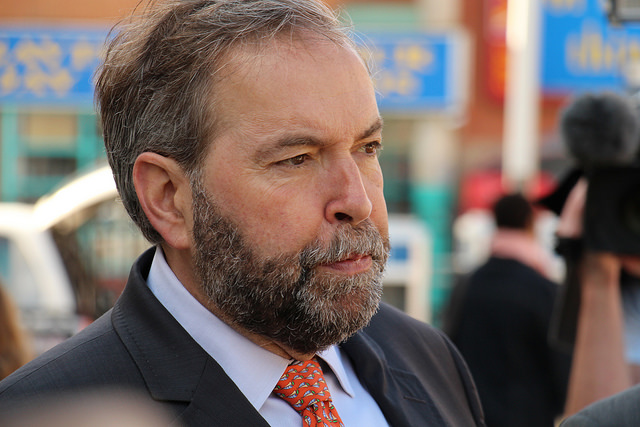Chip in to keep stories like these coming.
We were just getting somewhere toward the end of Wednesday afternoon’s debate on Prime Minister Stephen Harper’s Rube Goldberg-ish monster of an anti-terrorism bill, Bill C-51, when the Speaker had to cut it off for lack of time.
Justice Minister Peter MacKay, who took the floor after more than two hours of back and forth in the House, was going over the criminal code amendments in Bill C-51.
He had just arrived at the most contentious amendment, the creation of a new crime of “knowingly advocating the promotion of terrorism offences in general” — when time ran out.
MacKay’s presentation until that point had been more factual than most of the hyper-partisan rhetoric the Conservatives have offered so far.
One had the right to hope that, finally, somebody on the government side would offer something resembling a rationale for the Conservatives’ proposed new criminal code provision.
Now, we will have to wait until debate resumes.
Maybe then we’ll at last get some insight into the government’s thinking on a crucial matter about which they have been maddeningly evasive — in fact, downright taciturn — to this point.
What does ‘in general’ mean?
Official Opposition and NDP Leader Tom Mulcair, whose party will vote against Bill C-51, and Liberal Leader Justin Trudeau, whose party will vote in favour of it (whether or not it is amended), agree that the language in the “promotion of terrorism” part of the Bill is dangerously vague and broad.
They want a more rigorous definition of “in general.”
What would the phrase “in general” mean in practice? Can the government assure Canadians it would not mean open season on people who advocate a broad range of dissenting views — on the environment, on First Nations’ rights, on Canada’s foreign policy?
Mulcair’s NDP will likely suggest that it would be best to lose that new criminal provision altogether.
We can expect the NDP to argue that the existing law against promotion of terrorist acts (rather than something vague called terrorism in general) is quite sufficient.
Lumping peaceful protest with violent actions
Both opposition leaders also strenuously object to some key pieces of the government’s wording in the “Information Sharing” section of Bill C-51.
This is where the anti-terrorism bill provides a very broad brushstrokes definition of “activity that undermines the security of Canada.”
The definition enumerates a number of clearly dangerous activities such as “changing a government in Canada by force or unlawful means” and “proliferation of nuclear, chemical or biological weapons.”
But it also throws in the nebulously defined act of “interference with critical infrastructure,” which could mean civil disobedience on the site of pipeline construction, and “interference with the capability of the government… in relation to… the economic or financial stability of Canada,” which could cover a huge range of non-violent actions, including strikes.
There is, in fact, a whole lot of legal and non-violent activity that could be covered by the latter two items.
Grouping those peaceful forms of protest and dissent with genuinely bad stuff, such as the violent overthrow of the government, seems almost malicious.
It is hard to imagine this extremely broad definition of “undermining security” would withstand a Charter challenge. And it is even harder to believe that federal Justice Department lawyers did not warn the government of that peril in the drafting stage of Bill C-51.
We may never know the inside story.
Liberal and NDP objections are not only about oversight
Most commentary on the politics of Bill C-51 has it that the main opposition concern with the Bill — especially for Trudeau and his Liberals — is the lack of parliamentary oversight.
Both opposition parties have vigorously argued that the Security Intelligence Review Committee (SIRC), the existing body that reports to Parliament on the Canadian Security and Intelligence Service (CSIS), does not do oversight, only sporadic review, which is quite different.
The opposition parties say that Canada needs a committee of parliamentarians that would monitor and supervise the work of a CSIS with vastly expanded powers.
But the too-broad-wording issue is also a grave concern for both opposition parties.
As NDP Leader Mulcair pointed out during the debate on Wednesday, the wording of a law is not just a question of “semantics.”
When they have the force of law, and especially when they could entail significant criminal penalties and sanction “intrusive” activity on the part of the authorities, words matter — a lot.
Both opposition parties have promised to bring forward amendments to change this dangerously broad and vague wording. Just as both will likely propose amendments to create some form of parliamentary oversight.
Trudeau’s cognitive dissonance
The big difference between the Liberal and NDP positions is that, despite their leader’s eloquent critique of the many shortcomings of Bill C-51, the Liberals are twisting themselves into a pretzel in order to vote for it.
When asked about this cognitive dissonance, Trudeau could only say there were a few provisions in Bill C-51, such as those relating to information sharing in government, that might be helpful in the short term.
Ergo, his party must vote for the whole package.
If we had a minority parliament, such a position might make sense.
But since the Conservatives have the votes to pass Bill C-51 without the Liberals’ help, why vote for a Bill the Leader so thoroughly and forcefully condemned, on Wednesday afternoon, on the floor of the House?



